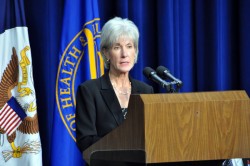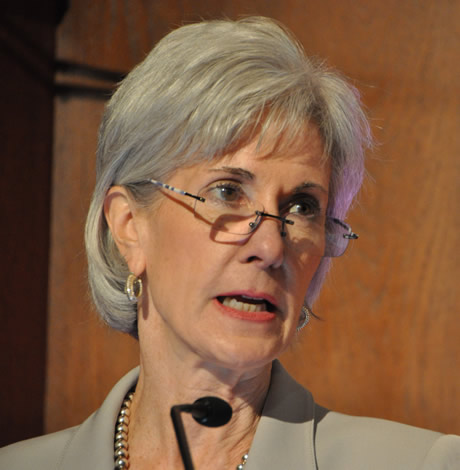National
HHS unveils plan to start data collection on LGBT health
Department will incorporate questions on sexual orientation into NHIS by 2013

The Department of Health & Human Services unveiled on Wednesday new details about plans to collect data on the LGBT population as part of federal health surveys.
According to a statement from the department, HHS will incorporate questions on sexual orientation into the National Health Interview Survey by 2013. Further, the department plans to hold a series of research roundtables with experts to determine the best way to collect data related to gender identity.
Secretary of Health & Human Services Kathleen Sebelius already announced last week that her department would start collecting health data on LGBT people during a news conference in response to a question from the Washington Blade. The information unveiled on Wednesday sheds greater light on the plan to start collecting this information.
In a statement, Sebelius emphasized that collecting health data on the LGBT population could lead to reduction of health disparities faced by the LGBT community.
“Health disparities have persistent and costly effects for minority communities, and the whole country,” Sebelius said. “Today we are taking critical steps toward ensuring the collection of useful national data on minority groups, including for the first time, LGBT populations. The data we will eventually collect in these efforts will serve as powerful tools and help us in our fight to end health disparities.”
According to a fact sheet from HHS, the administration has the authority to collect data on the LGBT population as part of the health care reform law passed by Congress last year, which allows the department the opportunity to collect demographic data to further improve understanding of health care disparities.
“In the past, identifying disparities and effectively monitoring efforts to reduce them has been limited by a lack of specificity, uniformity, and quality in data collection and reporting procedures,” the fact sheet states. “Consistent methods for collecting and reporting health data will help us better understand the nature of health problems in the LGBT community.”
The plan from HHS states that limited data on the LGBT community already shows the population is subject to certain health problems more than others. For example, gay and bisexual men make up more than half of new HIV infections in the United States each year; HIV infection among transgender women exceeds 25 percent nationwide; and lesbian and bisexual women are prone to receive less routine care than other women, including breast and cervical cancer screening.
The fact sheets made public on Wednesday outline the path under which the Obama administration plans to start collecting data on individuals based on their sexual orientation and gender identity:
* June to Dec. 2011 — Continue cognitive testing and begin field testing of sexual orientation data collection.
* Summer 2011 — Conduct first roundtable on gender identity data collection development. Complete initial development of sexual orientation data collection questionnaire.
* Winter 2011 — Conduct follow-up roundtable on gender identity data collection.
* Spring 2012 — Conduct and complete initial field testing of sexual orientation data collection. HHS Data Council presents a strategy to include gender identity data collection in HHS surveys.
* Winter 2012 — Conduct and complete large scale field test of sexual orientation data collection.
* 2013 — If the field test is successful, implement new data collection on sexual orientation into the full National Health Interview Survey data collection.
Gary Gates, distinguished scholar at the Williams Institute at University of California in Los Angeles, said the new details on data collection for LGBT people “solidifies the commitment that Secretary Sebelius made last week to provide more and better data” on LGBT health needs.
“As was clearly stated in the findings from the recent Institutes of Medicine report on LGBT health disparities, the need for more data is acute,” Gates said. “I urge HHS to move as quickly as possible to include sexual orientation and gender identity questions on the NHIS.”
Mara Keisling, executive director of the National Center for Transgender Equality, called the commitment from the Obama administration to collect data on the LGBT population “a big deal.”
“When the federal government starts to count us, we will have the proof of the health disparities we all know exist,” Keisling said. “With the data, advocacy for better health programs becomes possible, vital resources can be directed to our community, and better health for transgender people will follow.”

The Comings & Goings column is about sharing the professional successes of our community. We want to recognize those landing new jobs, new clients for their business, joining boards of organizations and other achievements. Please share your successes with us at [email protected].
Congratulations to Gil Pontes III on his recent appointment to the Financial Advisory Board for the City of Wilton Manors, Fla. Upon being appointed he said, “I’m honored to join the Financial Advisory Board for the City of Wilton Manors at such an important moment for our community. In my role as Executive Director of the NextGen Chamber of Commerce, I spend much of my time focused on economic growth, fiscal sustainability, and the long-term competitiveness of emerging business leaders. I look forward to bringing that perspective to Wilton Manors — helping ensure responsible stewardship of public resources while supporting a vibrant, inclusive local economy.”
Pontes is a nonprofit executive with years of development, operations, budget, management, and strategic planning experience in 501(c)(3), 501(c)(4), and political organizations. Pontes is currently executive director of NextGen, Chamber of Commerce. NextGen Chamber’s mission is to “empower emerging business leaders by generating insights, encouraging engagement, and nurturing leadership development to shape the future economy.” Prior to that he served as managing director of The Nora Project, and director of development also at The Nora Project. He has held a number of other positions including Major Gifts Officer, Thundermist Health Center, and has worked in both real estate and banking including as Business Solutions Adviser, Ironwood Financial. For three years he was a Selectman, Town of Berkley, Mass. In that role, he managed HR and general governance for town government. There were 200+ staff and 6,500 constituents. He balanced a $20,000,000 budget annually, established an Economic Development Committee, and hired the first town administrator.
Pontes earned his bachelor’s degree in political science from the University of Massachusetts, Dartmouth.
Kansas
ACLU sues Kansas over law invalidating trans residents’ IDs
A new Kansas bill requires transgender residents to have their driver’s licenses reflect their sex assigned at birth, invalidating current licenses.

Transgender people across Kansas received letters in the mail on Wednesday demanding the immediate surrender of their driver’s licenses following passage of one of the harshest transgender bathroom bans in the nation. Now the American Civil Liberties Union is filing a lawsuit to block the ban and protect transgender residents from what advocates describe as “sweeping” and “punitive” consequences.
Independent journalist Erin Reed broke the story Wednesday after lawmakers approved House Substitute for Senate Bill 244. In her reporting, Reed included a photo of the letter sent to transgender Kansans, requiring them to obtain a driver’s license that reflects their sex assigned at birth rather than the gender with which they identify.
According to the reporting, transgender Kansans must surrender their driver’s licenses and that their current credentials — regardless of expiration date — will be considered invalid upon the law’s publication. The move effectively nullifies previously issued identification documents, creating immediate uncertainty for those impacted.
House Substitute for Senate Bill 244 also stipulates that any transgender person caught driving without a valid license could face a class B misdemeanor, punishable by up to six months in jail and a $1,000 fine. That potential penalty adds a criminal dimension to what began as an administrative action. It also compounds the legal risks for transgender Kansans, as the state already requires county jails to house inmates according to sex assigned at birth — a policy that advocates say can place transgender detainees at heightened risk.
Beyond identification issues, SB 244 not only bans transgender people from using restrooms that match their gender identity in government buildings — including libraries, courthouses, state parks, hospitals, and interstate rest stops — with the possibility for criminal penalties, but also allows for what critics have described as a “bathroom bounty hunter” provision. The measure permits anyone who encounters a transgender person in a restroom — including potentially in private businesses — to sue them for large sums of money, dramatically expanding the scope of enforcement beyond government authorities.
The lawsuit challenging SB 244 was filed today in the District Court of Douglas County on behalf of anonymous plaintiffs Daniel Doe and Matthew Moe by the American Civil Liberties Union, the ACLU of Kansas, and Ballard Spahr LLP. The complaint argues that SB 244 violates the Kansas Constitution’s protections for personal autonomy, privacy, equality under the law, due process, and freedom of speech.
Additionally, the American Civil Liberties Union filed a temporary restraining order on behalf of the anonymous plaintiffs, arguing that the order — followed by a temporary injunction — is necessary to prevent the “irreparable harm” that would result from SB 244.
State Rep. Abi Boatman, a Wichita Democrat and the only transgender member of the Kansas Legislature, told the Kansas City Star on Wednesday that “persecution is the point.”
“This legislation is a direct attack on the dignity and humanity of transgender Kansans,” said Monica Bennett, legal director of the ACLU of Kansas. “It undermines our state’s strong constitutional protections against government overreach and persecution.”
“SB 244 is a cruel and craven threat to public safety all in the name of fostering fear, division, and paranoia,” said Harper Seldin, senior staff attorney for the ACLU’s LGBTQ & HIV Rights Project. “The invalidation of state-issued IDs threatens to out transgender people against their will every time they apply for a job, rent an apartment, or interact with police. Taken as a whole, SB 244 is a transparent attempt to deny transgender people autonomy over their own identities and push them out of public life altogether.”
“SB 244 presents a state-sanctioned attack on transgender people aimed at silencing, dehumanizing, and alienating Kansans whose gender identity does not conform to the state legislature’s preferences,” said Heather St. Clair, a Ballard Spahr litigator working on the case. “Ballard Spahr is committed to standing with the ACLU and the plaintiffs in fighting on behalf of transgender Kansans for a remedy against the injustices presented by SB 244, and is dedicated to protecting the constitutional rights jeopardized by this new law.”
National
After layoffs at Advocate, parent company acquires ‘Them’ from Conde Nast
Top editorial staff let go last week

Former staff members at the Advocate and Out magazines revealed that parent company Equalpride laid off a number of employees late last week.
Those let go included Advocate editor-in-chief Alex Cooper, Pride.com editor-in-chief Rachel Shatto, brand partnerships manager Erin Manley, community editor Marie-Adélina de la Ferriére, and Out magazine staff writers Moises Mendez and Bernardo Sim, according to a report in Hollywood Reporter.
Cooper, who joined the company in 2021, posted to social media that, “Few people have had the privilege of leading this legendary LGBTQ+ news outlet, and I’m deeply honored to have been one of them. To my team: thank you for the last four years. You’ve been the best. For those also affected today, please let me know how I can support you.”
The Advocate’s PR firm when reached by the Blade said it no longer represents the company. Emails to the Advocate went unanswered.
Equalpride on Friday announced it acquired “Them,” a digital LGBTQ outlet founded in 2017 by Conde Nast.
“Equalpride exists to elevate, celebrate and protect LGBTQ+ storytelling at scale,” Equalpride CEO Mark Berryhill said according to Hollywood Reporter. “By combining the strengths of our brands with this respected digital platform, we’re creating a unified ecosystem that delivers even more impact for our audiences, advertisers, and community partners.”
It’s not clear if “Them” staff would take over editorial responsibilities for the Advocate and Out.
-

 Federal Government4 days ago
Federal Government4 days agoTwo very different views of the State of the Union
-

 Virginia4 days ago
Virginia4 days agoVa. activists preparing campaign in support of repealing marriage amendment
-

 Opinions4 days ago
Opinions4 days agoThe global cost of Trump’s foreign aid ideology
-

 Movies3 days ago
Movies3 days agoMoving doc ‘Come See Me’ is more than Oscar worthy
















